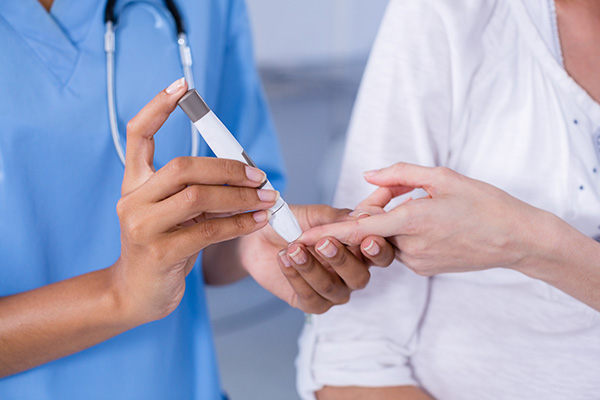Diabetes Clinic
Please Note: our diabetes clinics will be a mix of phone call appointments and face to face appointments.
Your diabetic appointments (annual and six month reviews) will generally start with a face to face appointment with one of our nurses or HCA's.
You'll have your usual diabetes health checks in these appointments - a blood test, foot check (at your annual review), blood pressure and weight check. These will be 15 minutes long appointments.
Please bring a first urine sample of the day with you to your appointment - you can pick up a sample bottle from our reception at Victoria House Surgery.
If you have a home blood pressure monitor, we ask that you bring 7 days worth of blood pressure readings with you to these appointments.
While at your appointment, we'll book you a follow up appointment, usually a week or two after your review appointment, with our diabetes nurse, Sam Fincham. This will either be face to face or a telephone appointment.

Help for diabetes patients during the Covid-19 pandemic
A new helpline has been set up in Oxfordshire by the Oxford University Hospitals NHS Trust (OUH) for patients who may be concerned about their diabetes during the Covid-19 pandemic.
If you require advice, you can call the helpline on: 01865 857 357.
For patients with Type 1 Diabetes
Two new apps have been launched to help you manage your diabetes duing the Covid-19 pandemic.
Digibete - Children and young people with Type 1 diabetes and their families can use this website and app for a wide range of awareness, education, training and support resources.
MyType1Diabetes - Adults with Type 1 diabetes can use this website which includes videos and eLearning courses to help them understand more about their Type 1 diabetes and increase their confidence in how to manage it.
Why is a diabetic review important to me?

Feet
You should have a diabetic foot check at least once a year here at the GP surgery (even if you are seen by OCDEM at the hospital).
Diabetes can affect the blood supply to the feet and can also lead to reduced sensation.
By having your feet checked regularly, early changes can be detected and managed appropriately.
Eyes
Once a year you will be invited to attend for a diabetic eye check. This is a national screening programme offered to all patients with diabetes aged 12 years and over. The delicate small blood vessels at the back of the eye can become damaged if you have diabetes and so detecting early changes can help prevent further complications.


Kidneys
You will be asked to provide a morning urine sample every 12 months. The sample is sent off to look for protein in the urine.
Protein in the urine can be the first sign that indicates the blood supply to the kidneys is being compromised which in diabetes can lead to further complications if not treated early.
Blood Pressure
In diabetes, the target blood pressure is slightly lower and that is because a higher blood pressure can potentially damage the smaller more vulnerable blood vessels in the body, for example, in the eyes, the kidneys, and the feet.
Did you know you can check your own blood pressure in the waiting room? Be sure to give the result to one of our receptionists so we can record it on your record for monitoring.


HbA1c
We know that in diabetes the level of blood glucose in the body can fluctuate. The aim is to keep it within a healthy range avoiding hypoglycaemia (too low) and hyperglycaemia (too high).
Abnormal blood glucose levels can damage the blood vessels in the body, including those that supply the heart, the brain, the eyes, the kidneys, and the feet.
Lifestyle
At your diabetic review we can discuss ways in which you can adopt a healthy eating pattern combined with keeping active.
If weight loss is a goal, then there are a number of programmes within the Oxfordshire area that have been designed to help patients lose weight and lead a more active lifestyle.

Diabetes and driving
To read more about how having diabetes can affect your driving, please visit the DVLA/Gov website
Healthier You - the National Diabetes Prevention Programme
The National Diabetes Prevention Programme (NDPP) is a programme that is designed to help patients with pre-diabetes.
The main aim to help you make lifestyle changes so that you don't get Type 2 diabetes in the future - this includes advice and support about healthy eating, losing weight, physical activity programmes, and managing your general wellbeing.
The service is free and there are local programmes available.
To see if you qualify for the programme, visit the website where you can get more information about the different kind of risk factors for Type 2 diabetes. You'll also have to have a blood test so speak to our receptionists to arrange a bloods test with one of our HCA's.
After that, if you qualify, you can speak to your GP about getting referred.
Know Your Risk
Diabetes UK have a tool on their website which can calculate your Type 2 Diabetes Risk Score - click here to use to the tool.
Diabetes Structured Education
Oxford Health Community Type 2 Diabetes Team run a Diabetes Structure Education service - this is designed to support you in developing skills, knowledge and confidence so that you can take responsibility for decisions about managing your condition and live a healthy life. These are FREE to you if you have Type 2 Diabetes.
You can self-refer to this service, or you can ask your GP for a referral. To self-refer, just visit their website
Here is a leaflet they have produced that helps explains in more detail what the aims of the courses they run are:
Your Guide to Diabetes Education
INDEX - Services
We use cookies to help provide you with the best possible online experience.
By using this site, you agree that we may store and access cookies on your device. Cookie policy.
Cookie settings.
Functional Cookies
Functional Cookies are enabled by default at all times so that we can save your preferences for cookie settings and ensure site works and delivers best experience.
3rd Party Cookies
This website uses Google Analytics to collect anonymous information such as the number of visitors to the site, and the most popular pages.
Keeping this cookie enabled helps us to improve our website.

